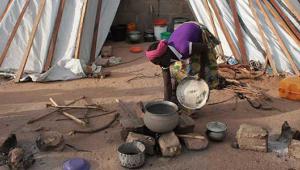asia_phones.jpg

A market trader in Myanmar
Speaking at a conference in the Philippines earlier this week, Bambang Susantono said that 2.2 billion people – nearly three fifth’s of the region’s population – slip through the cracks; they are not picked up by welfare programmes and lack any employment protection because of the informal nature of their work.
“[They] are not among the extreme poor, but work in the informal sector, where social protection coverage is largely absent,” he explained.
“Those struggling in the ‘missing middle’ generally miss out on state-provided cash transfers targeting the poor, they are not part of any contributory pension programme, and can only dream about sick leave and maternity benefits, and accident or unemployment insurance.”
He warned that failure to build comprehensive social protection systems will mean crises take a much larger social toll, and will hamper progress towards the sustainable development goals – especially their target to “leave no one behind”.
Susantono also said that most governments in the region do not invest enough in social protection, with spending on such programmes amounting to 4.3% of GDP in Asia and just 2.3% in the Pacific.
Populations in the region are ageing, too, he continued. The population is expected to include an additional 337 million people over 60 by 2030, and Asia will be home to 60% of the world’s older people.
In addition, social protection programmes are too fragmented, he said, with some nations having a large number of programmes that lead to duplication of beneficiaries, inefficient service delivery and high administrative costs.
For example, Armenia has 81 such programmes, while Bangladesh, Indonesia, Pakistan, the Philippines, Thailand and Uzbekistan all have between 30 and 40.
These programmes have also failed to keep pace with growing mobility and interconnectedness, he added, and, as a result, protections do not travel with workers.
Finally, a lack of capacity to implement and monitor programmes due to a lack of appropriate systems, tools or trained personnel meant governments did not have sufficient information to inform policy decisions and design programmes.
He pointed to a number of innovations and developments that could help governments overcome these difficulties, including ICT and national identification systems that could be linked to social welfare programmes.
Tackling these problems has become “one of the most pressing issues demanding government attention”, he stated.
“Developing Asia continues to lead the world with its high rates of economic growth,” he continued. “Yet too few people see the benefits of such growth and they miss out on the opportunities others enjoy.
“Comprehensive social protection systems will contribute to the region’s inclusive growth. They will ensure that all move upward together, that people can count on help should things take a turn for the worse, and that people have the basic means of support if they cannot work or are retired.
“Providing social protection is one of the most direct ways of making sure that people are included in progress, poverty and inequality are reduced, and that social cohesion is nurtured.”












